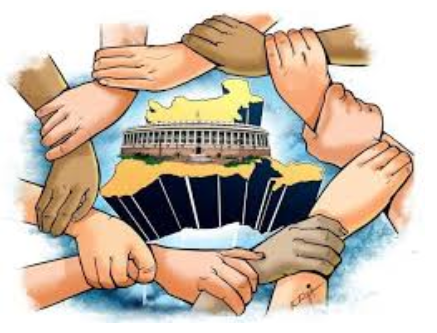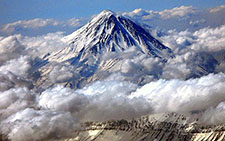India Federalism
human concern over controlling Power-holder and power as most dangerous phenomenon for humanity Rightly, and the most corrupt-maker element in the mankind history, lead men to taste deferent kind of ruling society system, and based on this philosophy wised Indian revolutionary leaders has chosen federal system as most effective structure to make them able to came over their challenges after independent from British ruler in 1947, so new India that contain vast diversity, is shaped geo-politically by states and some independents territories based on federalism, and power that was shared in National, state and local level and politically within dependent Executive, legislative and judiciary level with powerful-direct elected parliament.
Indian revolutionary activists were aware of power and power-holder potential problems and if power gathers in the hand of one person, a group or class, the disaster that will happen ultimately, thus they try to regulate ruling system well by choosing federal system.
Indian Federal system:
Part 11 of the Indian constitution that on January 26 1950 came to force defines the power distribution between the central or federal government and its State governments. In federal system national and states government work together to put in to effect and enforce law and punish law breakers. Federalism in India has a strong preference towards the central Government. Some unique features of federalism in India are:
Ø Indian State representation in the Parliament (Lok Sabha) is widely deferent from one state to another and it depends on a number of factors, including demography and total land area.
Ø No double citizenship, No separate citizenship for country and state.
Ø The consent of a state is not required by the Parliament to alter its boundaries.
Ø No state, except Jammu and Kashmir, can draw its own Constitution.
Ø No state has the right to secede.
Ø No division of public services.
The Union and states have independent executive staffs fully controlled by respected governments and executive power of the states and the Centre are extended on issues they are empowered to legislate.
Union control over states:
According to the Article 356 of the Constitution of India, states must exercise their executive power in agreement with the laws made by the Central government.
Article 357 calls upon every state not to impede on the executive power of the Union within the states.
Articles 352 to 360 contain provisions which empower the Centre to take over the executive of the states on issues of national security or on the breakdown of constitutional machinery.
Governors are appointed by the Central government to oversee states. The president can dissolve the state assembly under the recommendation of the council of ministers by invoking Article 356 if and when states fail to comply with directives given by the Centre.
The Constitution provides that, except in a few cases, union law trumps state law. If any provision of a law made by the Legislature of a State is repugnant to any provision of a law made by Parliament which Parliament is competent to enact, or to any provision of an existing law with respect to one of the matters enumerated in the Concurrent List, then, the law made by Parliament, whether passed before or after the law made by the Legislature of such State, or, as the case may be, the existing law, shall prevail and the law made by the Legislature of the State shall, to the extent of the repugnancy, be void. There is an exception to this in cases "where a law made by the Legislature of a State with respect to one of the matters enumerated in the Concurrent List contains any provision repugnant to the provisions of an earlier law made by Parliament or an existing law with respect to that matter, then, the law so made by the Legislature of such State shall, if it has been reserved for the consideration of the President and has received his assent, prevail in that State Provided that nothing in this clause shall prevent Parliament from enacting at any time any law with respect to the same matter including a law adding to, amending, varying or repealing the law so made by the Legislature of the State."
Union level matter in Indian federal system:
Union list consists of 99 items (previously 97 items) on which the parliament has exclusive power to legislate with including: defence, armed forces, arms and ammunition, atomic energy, foreign affairs, war and peace, citizenship, extradition, railways, shipping and navigation, airways, posts and telegraphs, telephones, wireless and broadcasting, currency, foreign trade, inter-state trade and commerce, banking, insurance, control of industries, regulation and development of mines, mineral and oil resources, elections, audit of Government accounts, constitution and organisation of the Supreme Court, High Courts and union public service commission, income tax, custom duties and export duties, duties of excise, corporation tax, taxes on capital value of assets, estate duty, terminal taxes.
States level matter in Indian federal system:
State list consists of 61 items (previously 66 items). Uniformity is desirable but not essential on items in this list: maintaining law and order, police forces, healthcare, transport, land policies, electricity in state, village administration, etc. the state legislature has exclusive power to make laws on these subjects. But in certain circumstances, the parliament can also make laws on subjects mentioned in the State list.
Though states have exclusive powers to legislate with regards to items on the State list, articles 249, 250, 252, and 253 state situations in which the federal government can legislate on these items.
Advantage of Federal system:
v Federalism provides combine a strong central government to maintain order with strong states government.
v Federalism is a god way to rule large size countries with divers population
v Because every states has a copy of national government so it make a suitable situation to serve as training grounds for national politicians and as laboratories in which new ideas can be tested.
v Permits diversity and diffusion (distribution) of power
v Local government can handle local problem better
v More access point for political participation.
v Protect individual right against concentrated government power
v Raises experimentation and innovation
Disadvantage and arguments against Federal system:
v State government may resist national plans and policies epically powerful states can block plans
v May permit economic inequality across statesor racial discrimination
v Some see expansion of national powers as a danger
v Make national unity difficult to achieve and maintain
v Law enforcement and justice are uneven
v Small unit may face lack expertise and money
v May promote local dominance by especial interest
Central government role in Federal system:
v Declare war
v Creation and maintain armed force
v Establish foreign policies
v Regulate interstate and foreign trade
v Coin money
v Make copyright and patent law
v Establish postal offices
State government role in Federal system:
v Establish local government
v Establish and maintain schools
v Regulate trade within states
v Conduct elections
v Provide for public safety
v Provide and establish corporations
Central - State government joint role in Federal system:
Raise and collect taxes
v Provide for the public welfare
v Justice criminals
v Borrow money
v Licence banks
v Build roads
Course:
Politic and Governing in India
by: Dr. Mandana Tesheyar
Article by:
Seyed Mostafa Mostafavi - M.A Student in Indian Studies
Faculty of world studies - University of Tehran
1392/1/25
+ نوشته شده در دوشنبه بیست و سوم اردیبهشت ۱۳۹۲ ساعت 12:49 شماره پست: 283
- توضیحات
- زیر مجموعه: مطالب نویسنده
- دسته: My English Production
- تاریخ ایجاد در 20 خرداد 1395
- بازدید: 2108





